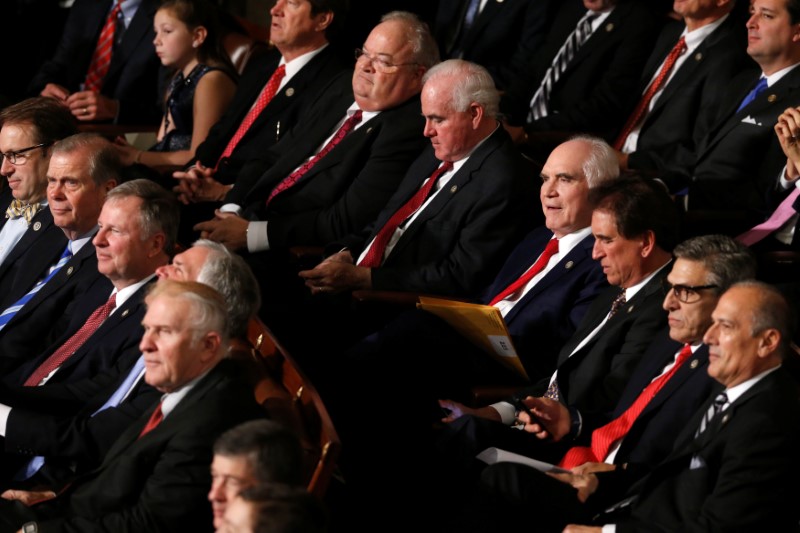
By Susan Cornwell and Valerie Volcovici
WASHINGTON (Reuters) – U.S. House Republicans are working on changes to their healthcare overhaul bill to provide more generous tax credits for older Americans and add a work requirement for the Medicaid program for the poor, House Speaker Paul Ryan said on Sunday.
Ryan said Republican leaders still planned to bring the healthcare bill to a vote on the House of Representatives floor on Thursday. Speaking on the “Fox News Sunday” television program, he said leaders were working to address concerns that had been raised by rank-and-file Republicans to the legislation.
Republicans remain deeply divided over the healthcare overhaul, which is President Donald Trump’s first major legislative initiative. It aims to fulfill his campaign pledge to repeal and replace the Affordable Care Act, popularly known as Obamacare, the signature healthcare program of his Democratic predecessor, Barack Obama.
Democrats say the Republican plan could throw millions off health insurance and hurt the elderly, poor and working families while giving tax cuts to the rich.
“We think we should be offering even more assistance than the bill currently does” for lower-income people age 50 to 64, Ryan, the top Republican in Congress, said of the tax credits for health insurance that are proposed in the legislation.
Ryan also said Republicans were working on changes that would allow federal block grants to states for Medicaid and permit states to impose a work requirement for able-bodied Medicaid recipients.
Trump told reporters in a brief conversation aboard Air Force One that he had meetings about healthcare reform in Florida at the weekend and that the effort to sell the proposal was going well.
He has been wooing lawmakers to vote for the bill and won the backing of a dozen conservative lawmakers on Friday after an Oval Office meeting in which the president endorsed a work requirement and block-grant option for Medicaid.
Trump is set to meet Ezekiel Emanuel, a health policy special adviser under Obama who helped shape the Affordable Care Acton, at the White House on Monday, along with Ryan and Health and Human Services Secretary Tom Price.
Block grants would give states a set amount of money to cover people on the Medicaid program and provide flexibility in spending decisions. However, there is no guarantee funding would keep up with future demands.
“TRYING TO FIX BILL”
While Ryan said he felt “very good” about the health bill’s prospects in the House, a leading conservative lawmaker, Representative Mark Meadows, told the C-Span “Newsmakers” program that there were currently 40 Republican “no” votes in the House. Republicans hold a majority in the chamber but cannot afford to have more than 21 defections for the measure to pass.
Meadows and two other Republican opponents of the bill, Senators Mike Lee of Utah and Ted Cruz of Texas, met at Trump’s Mar-a-Lago estate in Florida on Saturday “negotiating with the president’s team, trying to fix this bill,” Cruz told CBS’ “Face the Nation.”
North Carolina Republican Meadows said the changes being considered for the Medicaid program would not go far enough if they left it up to states to decide whether to put in place a work requirement.
Price acknowledged the tough negotiations, telling ABC’s “This Week”: “It’s a fine needle that needs to be thread, there’s no doubt about it.”
The healthcare bill would face significant challenges in the Senate even if it were to pass the House.
Senator Tom Cotton, a conservative Arkansas Republican, said the bill would not reduce premiums for people on the private insurance market. “It’s fixable, but it’s going to take a lot of work,” Cotton said on CNN’s “State of the Union.”
Moderate Republicans have also expressed concerns about the bill, and their worries are often not the same as that of conservatives.
Speaking on NBC’s “Meet the Press,” Republican Senator Susan Collins of Maine worried the bill would harm older Americans, and shift Medicaid costs to states – something critics say a block-grant approach would only make worse.
Collins said coverage issues must also be dealt with, citing a report from the Congressional Budget Office that said 14 million people would lose health coverage under the House bill over the next year and 24 million over the next decade.
Affordability has been one of the bigger concerns that insurers and hospital groups have raised about the legislation. To the extent that a change in tax credits makes healthcare more affordable for some people, insurers and hospitals could stand to benefit.
The BlueCross BlueShield Association emphasized the need for the replacement to be affordable when the draft of the healthcare bill was released earlier this month. The association represents BCBS insurers that cover the vast majority of the roughly 10 million people enrolled in 2017 Obamacare plans.









